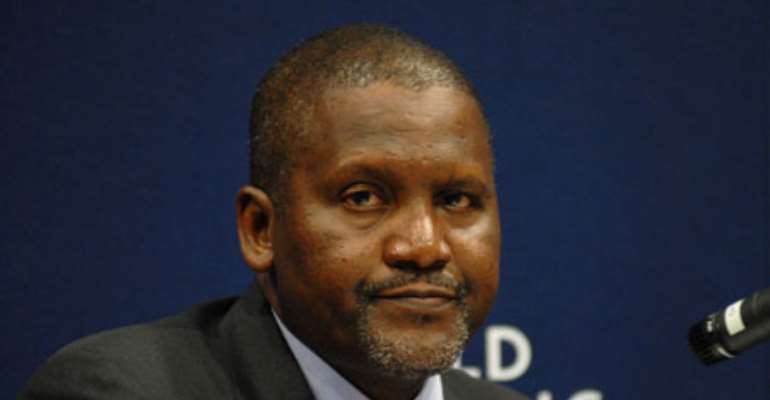Dangote promises $16bn investments to boost Nigeria's GDP

The President, Dangote Group, Aliko Dangote, announced yesterday that his group would make investments of $16billion over the next four years, culminating to a contribution of $34.9 billion in 2017 in Gross Domestic Product (GDP).
Dangote stated this in his lecture titled '100years of Nationhood- An entrepreneur's perspective', at the independence anniversary lecture of the Lagos Chamber of Commerce and Industry (LCCI) in Lagos.
'Our medium term growth plans will see Dangote group contributing $16 billion investment to the economy over the next four years. This is expected to drive growth of job creation initiatives as well as the GDP. The past century has presented us with some satisfaction, especially for us in the private sector despite the challenges we have faced. I am optimistic of a bright future for the country in the years to come', he said.
He added that to enhance the cement supply gap in the country, Dangote Cement would invest $4.7 billion over the next four years to ensure that cement supply stays ahead of demand while commissioning an additional 10 million metric tonnes capacity in the country by June 2014 with three new cement plants.
Dangote further stated that though indigenous entrepreneurs now dominate some sectors that were at inception controlled by foreign firms and the public sector, there is a need for the federal government to facilitate a partnership that would foster the growth of the economy as well as small businesses.
He also emphasized the need for government to promote exportation of goods and address infrastructural challenges in order to boost competitiveness of Nigerian goods.
Earlier, the nation’s Coordinating Minister for the Economy/Minister of Finance, Dr. Ngozi Okonjo-Iweala, who represented President Goodluck Jonathan, explained that once the restructuring of the Development Finance Institutions (DFIs) is concluded, the interest rates on loans would drop, as access to finance would become easy and competitive.
'We have decided that the best way to go is to set up a Development Finance Institution to wholesale money to commercial banks and specialised banks. We will create this institution in the next 18 months. The ADB is putting in another $400 million into it. We are trying to raise the money to do it long-term, 20-year money, 30 years, 10 years of grace and reasonable interest rate so that we can down the cost of borrowing.
'When we get this, it will drive down the cost of finance. We are not going to dictate to banks how much they charge; we will simply put up a system that will provide enough resources for long-term financing. A lot of multilateral institutions are supporting us and this thing is going to happen. So give us 18 months', she added.
The Minister also debunked claims that the economy was in a fragile state stating that the nation was not shielded from global shock but has done a lot in terms of recovery.
She said: 'The economy is doing well. We may experience cash flow that is not frequent, that does not mean the country is not doing well. Nigeria is an asset-rich country and is strong. Anyone with contrary data should come forward with it. This has been checked with the macro-economic policies.
'The economic indicators are positive. We expended a lot of energy on the macro-economic framework in order to ensure that the nation is doing fine and this is obvious going by the way the Euro-bond was over-subscribed'.
LCCI's President, Goodie Ibru emphasised the need for the country to diversify the economy describing the state of the economy as 'too dependent on the oil and gas sector; weak in domestic production and local value addition'.
According to him, as the country celebrates its centenary, the diversification of the economy has become imperative and compelling if the nation hopes to mitigate the risks of shocks and vulnerability.
For Nigeria to ensure economic progress that is inclusive, equitable and sustainable, Ibru stressed the need for government to encourage value-addition in the productive sectors rather than undue exploitation of natural resources.
